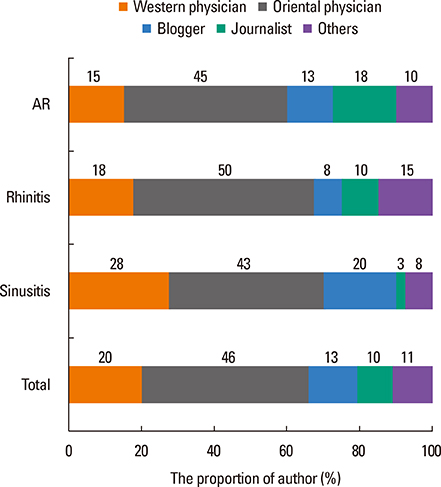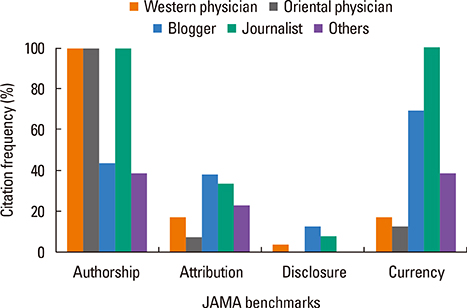Allergy Asthma Immunol Res.
2015 Mar;7(2):141-147. 10.4168/aair.2015.7.2.141.
The Quality of Health Information on Allergic Rhinitis, Rhinitis, and Sinusitis Available on the Internet
- Affiliations
-
- 1Department of Otorhinolaryngology-Head and Neck Surgery, Seoul National University College of Medicine, Seoul, Korea. csrhee@snu.ac.kr
- 2Department of Otorhinolaryngology-Head and Neck Surgery, Seoul National University Bundang Hospital, Seongnam, Korea.
- 3Institute of Allergy and Clinical Immunology, Seoul National University Medical Research Center, Seoul, Korea.
- 4Sensory Organ Research Center, Seoul National University Medical Research Center, Seoul, Korea.
- 5Graduate School of Immunology, Seoul National University, Seoul, Korea.
- KMID: 2365542
- DOI: http://doi.org/10.4168/aair.2015.7.2.141
Abstract
- PURPOSE
The internet has become one of the most important media outlets used to obtain health information. Therefore, the quality of health information available on the internet is very important. We evaluated the quality of internet-derived health information on allergic rhinitis, rhinitis and sinusitis and compared these results to those of previous studies performed five years ago.
METHODS
The terms "allergic rhinitis (AR)", "rhinitis" and "sinusitis" were searched among the four most commonly used search engines in South Korea. These websites were evaluated according to the author, the Journal of the American Medical Association (JAMA) benchmarks, the DISCERN questionnaire and the Allergic rhinitis and its Impact on Asthma (ARIA) 2008 Update.
RESULTS
A total of 120 websites were obtained and analyzed. For all diseases, "Oriental physician" had the largest portion (almost half of all websites), followed by "Western physician". Based on analyses using the JAMA benchmark, "Attribution" and "Disclosure" were ignored in almost all surveyed websites. According to the scores of the DISCERN question, the majority of websites did not supply appropriate references for their health information, and information on the negative aspects of treatment such as risks and uncertainty was not provided in several websites. In an analysis based on the ARIA 2008 Update concepts, 65% of websites pertaining to health information on AR contained unreliable information.
CONCLUSIONS
The quality of health information on the internet was not acceptable. Thus, governmental regulation or control to improve the quality of health information is required.
Keyword
MeSH Terms
Figure
Cited by 2 articles
-
A Study of the Accuracy and Reliability of Articles about Alopecia in Newspapers
Hyojin Kim, In Ho Park, Do Hyeong Kim, So Hee Park, Gyeong Je Cho, Jung Eun Seol
Ann Dermatol. 2018;30(3):309-315. doi: 10.5021/ad.2018.30.3.309.Unmet Primary Physicians' Needs for Allergic Rhinitis Care in Korea
Hyeon-Jong Yang, Young Hyo Kim, Bora Lee, Do Youn Kong, Dong-Kyu Kim, Mi-Ae Kim, Bong-Seong Kim, Won-young Kim, Jeong Hee Kim, Yang Park, So Yeon Park, Woo Yong Bae, Keejae Song, Min Suk Yang, Sang Min Lee, Young-Mok Lee, Hyun Jong Lee, Jae-Hong Cho, Hye Mi Jee, Jeong-Hee Choi, Young Yoo, Young-Il Koh,
Allergy Asthma Immunol Res. 2017;9(3):265-271. doi: 10.4168/aair.2017.9.3.265.
Reference
-
1. Eysenbach G. Consumer health informatics. BMJ. 2000; 320:1713–1716.2. Winker MA, Flanagin A, Chi-Lum B, White J, Andrews K, Kennett RL, et al. Guidelines for medical and health information sites on the internet: principles governing AMA web sites. American Medical Association. JAMA. 2000; 283:1600–1606.3. Al-Bahrani A, Plusa S. The quality of patient-orientated internet information on colorectal cancer. Colorectal Dis. 2004; 6:323–326.4. Bernard A, Langille M, Hughes S, Rose C, Leddin D, Veldhuyzen van Zanten S. A systematic review of patient inflammatory bowel disease information resources on the World Wide Web. Am J Gastroenterol. 2007; 102:2070–2077.5. Chang MY, Han DH, Moon IJ, Kim ST, Kim DY, Lee CH, et al. Assessment of allergic rhinitis websites in Korea. Clin Exp Otorhinolaryngol. 2010; 3:32–36.6. Demetriades AK, Alg VS, Hardwidge C. Are internet sites providing evidence-based information for patients suffering with Trigeminal Neuralgia? Scott Med J. 2014; 59:114–117.7. Goslin RA, Elhassan HA. Evaluating internet health resources in ear, nose, and throat surgery. Laryngoscope. 2013; 123:1626–1631.8. Hallingbye T, Serafini M. Assessment of the quality of postherpetic neuralgia treatment information on the Internet. J Pain. 2011; 12:1149–1154.9. Hanif F, Abayasekara K, Willcocks L, Jolly EC, Jamieson NV, Praseedom RK, et al. The quality of information about kidney transplantation on the World Wide Web. Clin Transplant. 2007; 21:371–376.10. Hanif F, Sivaprakasam R, Butler A, Huguet E, Pettigrew GJ, Michael ED, et al. Information about liver transplantation on the World Wide Web. Med Inform Internet Med. 2006; 31:153–160.11. López-Jornet P, Camacho-Alonso F. The quality of internet sites providing information relating to oral cancer. Oral Oncol. 2009; 45:e95–e98.12. Morr S, Shanti N, Carrer A, Kubeck J, Gerling MC. Quality of information concerning cervical disc herniation on the Internet. Spine J. 2010; 10:350–354.13. Peterlin BL, Gambini-Suarez E, Lidicker J, Levin M. An analysis of cluster headache information provided on internet websites. Headache. 2008; 48:378–384.14. Sambandam SN, Ramasamy V, Priyanka P, Ilango B. Quality analysis of patient information about knee arthroscopy on the World Wide Web. Arthroscopy. 2007; 23:509–513.2.15. Tan BH, Kostapanagiotou K, Jilaihawi AN. A review of mesothelioma information on the World Wide Web. J Thorac Oncol. 2009; 4:102–104.16. Korea Internet and Security Agency. 2013 Korea Internet White Paper. Seoul: Korea Internet and Security Agency;2013.17. Silberg WM, Lundberg GD, Musacchio RA. Assessing, controlling, and assuring the quality of medical information on the Internet: caveant lector et viewor--Let the reader and viewer beware. JAMA. 1997; 277:1244–1245.18. Charnock D, Shepperd S, Needham G, Gann R. DISCERN: an instrument for judging the quality of written consumer health information on treatment choices. J Epidemiol Community Health. 1999; 53:105–111.19. Bousquet J, Khaltaev N, Cruz AA, Denburg J, Fokkens WJ, Togias A, et al. Allergic Rhinitis and its Impact on Asthma (ARIA) 2008 update (in collaboration with the World Health Organization, GA(2)LEN and AllerGen). Allergy. 2008; 63:Suppl 86. 8–160.20. Health on the Net Foundation (CH). Code of ethics for health care sites [Internet]. Chêne-Bourg: Health on the Net Foundation;2006. cited 2014 Mar 3. Available from: http://www.hon.ch/HONcode/Patients/Korean.21. Korea Health Industry Development Institute. Korea health industry statistics system: industry statstics [Internet]. Cheongwon: Korea Health Industry Development Institute;2013. cited 2014 Mar 10. Available from: http://www.khiss.go.kr.22. Eisenberg DM, Kessler RC, Foster C, Norlock FE, Calkins DR, Delbanco TL. Unconventional medicine in the United States. Prevalence, costs, and patterns of use. N Engl J Med. 1993; 328:246–252.23. Eisenberg DM, Davis RB, Ettner SL, Appel S, Wilkey S, Van Rompay M, et al. Trends in alternative medicine use in the United States, 1990-1997: results of a follow-up national survey. JAMA. 1998; 280:1569–1575.24. Barnes PM, Powell-Griner E, McFann K, Nahin RL. Complementary and alternative medicine use among adults: United States, 2002. Adv Data. 2004; 1–19.25. Barnes PM, Bloom B, Nahin RL. Complementary and alternative medicine use among adults and children: United States, 2007. Natl Health Stat Report. 2008; 1–23.




